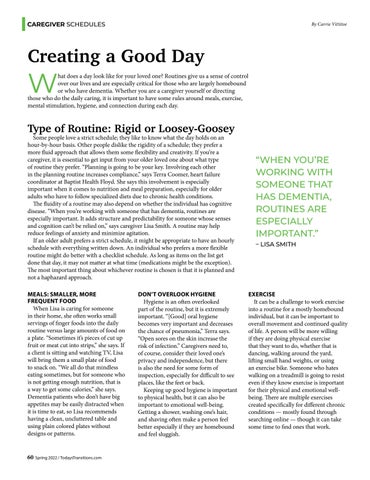CAREGIVER SCHEDULES
By Carrie Vittitoe
Creating a Good Day
W
hat does a day look like for your loved one? Routines give us a sense of control over our lives and are especially critical for those who are largely homebound or who have dementia. Whether you are a caregiver yourself or directing those who do the daily caring, it is important to have some rules around meals, exercise, mental stimulation, hygiene, and connection during each day.
Type of Routine: Rigid or Loosey-Goosey Some people love a strict schedule; they like to know what the day holds on an hour-by-hour basis. Other people dislike the rigidity of a schedule; they prefer a more fluid approach that allows them some flexibility and creativity. If you’re a caregiver, it is essential to get input from your older loved one about what type of routine they prefer. “Planning is going to be your key. Involving each other in the planning routine increases compliance,” says Terra Coomer, heart failure coordinator at Baptist Health Floyd. She says this involvement is especially important when it comes to nutrition and meal preparation, especially for older adults who have to follow specialized diets due to chronic health conditions. The fluidity of a routine may also depend on whether the individual has cognitive disease. “When you’re working with someone that has dementia, routines are especially important. It adds structure and predictability for someone whose senses and cognition can’t be relied on,” says caregiver Lisa Smith. A routine may help reduce feelings of anxiety and minimize agitation. If an older adult prefers a strict schedule, it might be appropriate to have an hourly schedule with everything written down. An individual who prefers a more flexible routine might do better with a checklist schedule. As long as items on the list get done that day, it may not matter at what time (medications might be the exception). The most important thing about whichever routine is chosen is that it is planned and not a haphazard approach. MEALS: SMALLER, MORE FREQUENT FOOD When Lisa is caring for someone in their home, she often works small servings of finger foods into the daily routine versus large amounts of food on a plate. “Sometimes it’s pieces of cut up fruit or meat cut into strips,” she says. If a client is sitting and watching TV, Lisa will bring them a small plate of food to snack on. “We all do that mindless eating sometimes, but for someone who is not getting enough nutrition, that is a way to get some calories,” she says. Dementia patients who don’t have big appetites may be easily distracted when it is time to eat, so Lisa recommends having a clean, uncluttered table and using plain colored plates without designs or patterns. 60 Spring 2022 / TodaysTransitions.com
DON’T OVERLOOK HYGIENE Hygiene is an often overlooked part of the routine, but it is extremely important. “[Good] oral hygiene becomes very important and decreases the chance of pneumonia,” Terra says. “Open sores on the skin increase the risk of infection.” Caregivers need to, of course, consider their loved one’s privacy and independence, but there is also the need for some form of inspection, especially for difficult to see places, like the feet or back. Keeping up good hygiene is important to physical health, but it can also be important to emotional well-being. Getting a shower, washing one’s hair, and shaving often make a person feel better especially if they are homebound and feel sluggish.
“WHEN YOU’RE WORKING WITH SOMEONE THAT HAS DEMENTIA, ROUTINES ARE ESPECIALLY IMPORTANT.” – LISA SMITH
EXERCISE It can be a challenge to work exercise into a routine for a mostly homebound individual, but it can be important to overall movement and continued quality of life. A person will be more willing if they are doing physical exercise that they want to do, whether that is dancing, walking around the yard, lifting small hand weights, or using an exercise bike. Someone who hates walking on a treadmill is going to resist even if they know exercise is important for their physical and emotional wellbeing. There are multiple exercises created specifically for different chronic conditions — mostly found through searching online — though it can take some time to find ones that work.























